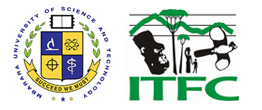Bwindi Impenetrable National Park contains almost half of the world’s remaining Mountain gorillas (Gorilla beringei beringei) and research has shown that this population is unique in many aspects of their ecology and behaviour.
In Bwindi, MPI-EVAN (Max Plank Institute for Evolutionary Anthropology) has been conducting research on the Kyagurilo Mountain gorilla groups with ITFC since 1998. The gorilla research is overseen by Dr Martha Robbins. This represents the second-longest study of habituated gorillas in Africa.
The research takes a multi-disciplinary approach to studying the social system of Bwindi Mountain gorillas by combining field observations of ecological conditions, gorilla behaviour, habitat utilization, and demographic events with hormonal measurements and genetic analysis.
The main goals of this project are:
- Further our understanding of the development and maintenance of social behaviour and reproductive strategies of male and female mountain gorillas, through the use of behavioural observations, hormone analysis, and genetic analysis.
- Understand the demography and life histories (birth rates, mortality, and potential growth rate) of the population through analysis of the long-term demographic data and genetic data obtained through faecal samples on Kyagurilo, other habituated groups, and from the unhabituated gorillas located throughout Bwindi.
- Examine the long-term patterns of ranging and habitat utilization of Bwindi gorillas in conjunction with measures of food availability to better understand gorilla movement patterns, habitat requirements, and the capacity for the population to increase.
- Examine the changes in gorilla behaviour during the habituation process to better understand the impact of human presence on gorilla behaviour and ecology. This is done in close conjunction with UWA.
Kyagurilo gorilla family
MPI also has been conducting a conservation education program with two local primary schools (Ruhija Primary School and Bitanwa Primary School) since 2007. We provide lessons on a monthly basis for more than 200 students in primary 5, 6, and 7. This program is currently managed by Ms Emily Turinawe.
The ‘backbone’ of the MPI research focusing on gorillas in Bwindi is with the one group habituated for research, the Kyagurilo Group. We have seen many changes in the group since 1998. For example a change in dominant silverback in 2004, the emigration of 4 young silverbacks (between 2009-2010) who were first observed as infants or juveniles, the deaths of two elderly females in 2009-2010, the immigration of 4 females into the group between 2000-2010, and several births.
Gorillas are long-lived so it takes years to see how their social dynamics and group structure can change over time. With the Kyagurilo group, we make detailed behavioural observations on the aggressive and affiliative interactions among group members, diet, and ranging patterns. This work is only possible through observations made for several hours each day. Thus, Kyagurilo group is not yet open for gorilla trekking tour adventures.
We conduct some research on other gorilla groups in Bwindi as well. For example, we have conducted research on diet and home range utilization using the groups habituated for tourism. This research has been done using methods that do not involve directly observing the gorillas.
We also have made an assessment of the demography of the Bwindi gorilla population using data on all births, deaths, and dispersal events of the individually known gorillas in all the habituated groups (tourism and research).
Lastly, some research has been done on a population level. We have done vegetation sampling through approximately one-third of the lower portion of the park used by the gorillas. We also have conducted genetic analysis of the entire population using faecal samples collected during the 2006 census.
This same work currently is being done from the 2011 census, which will provide us with a population-wide assessment of dispersal events over the past 5 years. The faecal samples are also being used for pathogen analysis on a park-wide basis and for comparisons with the analysis of the Virunga gorilla population.
